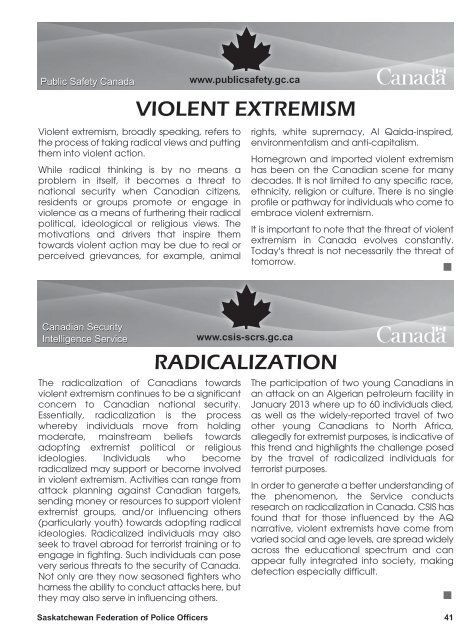DOMESTIC TERRORISM
SKPA15web
SKPA15web
You also want an ePaper? Increase the reach of your titles
YUMPU automatically turns print PDFs into web optimized ePapers that Google loves.
Public Safety Canada<br />
Violent extremism, broadly speaking, refers to<br />
the process of taking radical views and putting<br />
them into violent action.<br />
While radical thinking is by no means a<br />
problem in itself, it becomes a threat to<br />
national security when Canadian citizens,<br />
residents or groups promote or engage in<br />
violence as a means of furthering their radical<br />
political, ideological or religious views. The<br />
motivations and drivers that inspire them<br />
towards violent action may be due to real or<br />
perceived grievances, for example, animal<br />
www.publicsafety.gc.ca<br />
VIOLENT EXTREMISM<br />
rights, white supremacy, Al Qaida-inspired,<br />
environmentalism and anti-capitalism.<br />
Homegrown and imported violent extremism<br />
has been on the Canadian scene for many<br />
decades. It is not limited to any specific race,<br />
ethnicity, religion or culture. There is no single<br />
profile or pathway for individuals who come to<br />
embrace violent extremism.<br />
It is important to note that the threat of violent<br />
extremism in Canada evolves constantly.<br />
Today's threat is not necessarily the threat of<br />
tomorrow.<br />
Canadian Security<br />
Intelligence Service<br />
The radicalization of Canadians towards<br />
violent extremism continues to be a significant<br />
concern to Canadian national security.<br />
Essentially, radicalization is the process<br />
whereby individuals move from holding<br />
moderate, mainstream beliefs towards<br />
adopting extremist political or religious<br />
ideologies. Individuals who become<br />
radicalized may support or become involved<br />
in violent extremism. Activities can range from<br />
attack planning against Canadian targets,<br />
sending money or resources to support violent<br />
extremist groups, and/or influencing others<br />
(particularly youth) towards adopting radical<br />
ideologies. Radicalized individuals may also<br />
seek to travel abroad for terrorist training or to<br />
engage in fighting. Such individuals can pose<br />
very serious threats to the security of Canada.<br />
Not only are they now seasoned fighters who<br />
harness the ability to conduct attacks here, but<br />
they may also serve in influencing others.<br />
www.csis-scrs.gc.ca<br />
RADICALIZATION<br />
The participation of two young Canadians in<br />
an attack on an Algerian petroleum facility in<br />
January 2013 where up to 60 individuals died,<br />
as well as the widely-reported travel of two<br />
other young Canadians to North Africa,<br />
allegedly for extremist purposes, is indicative of<br />
this trend and highlights the challenge posed<br />
by the travel of radicalized individuals for<br />
terrorist purposes.<br />
In order to generate a better understanding of<br />
the phenomenon, the Service conducts<br />
research on radicalization in Canada. CSIS has<br />
found that for those influenced by the AQ<br />
narrative, violent extremists have come from<br />
varied social and age levels, are spread widely<br />
across the educational spectrum and can<br />
appear fully integrated into society, making<br />
detection especially difficult.<br />
Saskatchewan Federation of Police Officers 41


